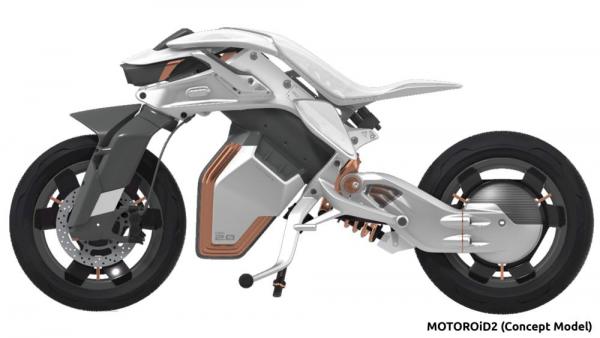
Yamaha has announced its presence at the 2023 Japan Mobility Show in Tokyo at the end of the month, as well as the exhibits it will be presenting.
The headlining exhibition from Yamaha at the 2023 Japan Mobility Show is undoubtedly the MOTOROiD2, which is an evolution from the original MOTOROiD concept shown in 2017.
Yamaha has been one of the motorcycle manufacturers to be most involved with the ideas of self-driven vehicles, from its R1-based Motobot to more recent applications in industrial vehicles with Panasonic.
Yamaha MOTOROiD2 concept.
MOTOROiD2, though, is perhaps the most advanced idea Yamaha has put to a motorcycle. Its philosophy is not one of full autonomy, but of an integration of human and artificial intelligence. Perhaps a summary of Yamaha’s idea with the project is to make the experience of owning a motorcycle more similar to that of owning an animal.
“MOTOROiD2 is [...] a vehicle for personal mobility that can recognize its owner, get up off its kickstand, and move alongside its rider,” Yamaha says. That owner recognition is not restricted to images of the owner’s face, but also of their gestures. The concept also considers the riding experience, of course. Yamaha says MOTOROiD2 “also has a distinctly lifelike feel when somebody is riding on its back and has a presence more like a lifetime companion.”
Yamaha MOTOROiD2 concept.
MOTOROiD2 makes use of a Active Mass Center Control System (AMCES) for “attitude sensing and self-balancing,” Yamaha says, as well as a “Leaf structure” that allows the chassis to react complementarily to the rider’s movements and inputs.
From the photos, it is not hard to see that this is not only a concept bike, but one which is about a million miles away from having the individual concepts which culminate in its design realised in a production model, but it is an interesting insight into (at least part of) Yamaha’s vision of the future of motorcycling.
Additional Yamaha exhibits at 2023 Japan Mobility Show
Yamaha’s other exhibits at the 2023 Japan Mobility Show include more concept models, existing models, and even ones from the past.
Among the concepts are Elove, E-FV, Y-00Z MTB, Y-01 AWD, and TMW. As suggested by its name, the Y-00Z MTB is an e-MTB concept making use of a split structure for the drive unit and an electronic power steering system which is presumably developed with some similarities to that which has been developed for dirt bikes by Yamaha in the All-Japan Motocross Championship.
Yamaha Y-00Z concept.
Y-01 AWD is another e-bike concept, but a gravel model, rather than a mountain bike. It is distinctive for being two-wheel-drive, thanks to a centrally mounted motor in combination with a front hub motor. Twin batteries and a coordinated operation of the two motors mean that long-distance rides are possible, while the wide tyres and the bike’s all-wheel-drive (hence ‘AWD’) design mean that this concept should be able to offer superior traction and rideability off-road.
Yamaha Y-01 AWD concept.
The TMW, on the other hand, is a three-wheeled vehicle which, from the single image shown, is seemingly intended for utilitarian purposes. It is Yamaha’s first attempt at what it calls an LMW (Leaning Multi-Wheeler), and uses a similar concept to that of the Yamaha Tricity and Yamaha Niken, in that it has two independent wheels at the front. The linkage which allows the bike to lean is also used to attach the front carrier rack, allowing the rack to stay level with the ground while the bike is leaning or even on an incline. The TMW is also both all-wheel-drive and hybrid, making use of an internal combustion engine to drive the rear wheel, and a hub motor to power each of the front wheels.
Yamaha TMW concept.
Yamaha Elove concept.
Elove is a concept electric scooter using the same Advanced Motorcycle Stabilization Assist System (AMSAS) that was present on the Motobot concept. In this case, the idea of the system is to create an easier riding experience at very low and walking speeds.
Yamaha E-FV concept.
The E-FV concept is an electric minibike which looks not entirely dissimilar to the Metrokits you would expect to find at a current minibike race meeting. Yamaha describes it as a bike intended for “family recreation” purposes. It was developed by a team of young engineers as a side project, and utilises the same motor as used in Yamaha’s electric trials bike, the TY-E, as well as Yamaha Corporation’s Active Sound Control technology, meaning an artificial exhaust note is produced when starting or turning off the bike.
Yamaha YXZ1000R hydrogen concept.
Last year, Yamaha signed a deal with Toyota to develop a hydrogen-fuelled engine for a Lexus off-road vehicle. The Yamaha YXZ1000R (Hydrogen Engine) is sort of what we envisaged at the time: a hydrogen-fuelled side-by-side; although, of course, this is a Yamaha and not a Lexus. In any case, this is a concept variant of Yamaha’s YXZ1000R side-by-side that runs 100% on hydrogen and “emits zero CO2,” Yamaha says. Yamaha adds that it is “exploring” the potential of hydrogen engines as a way to progress decarbonisation while maintaining the use of internal combustion engines, “in order to keep the unique appeal of these engines alive, such as their sound and feel when on the go, well into the future.”
Further, non-concept exhibits include an AMSAS-equipped Yamaha R3; an updated version of the aforementioned Yamaha TY-E, this time the TY-E 2.2; an XSR125, Yamaha MT-125, and Yamaha R125 all for the Japanese market; and the Yamaha YZR500 0W70 ridden to six Grand Prix victories by Kenny Roberts in the 1983 500cc World Championship.
Yamaha’s announcement of its own presence at the 2023 Japan Mobility Show comes after Honda’s previous announcement of its exhibitions at the show, which takes place from 28 October - 5 November.

